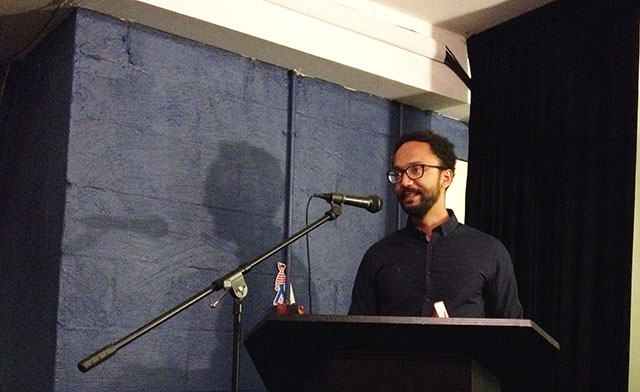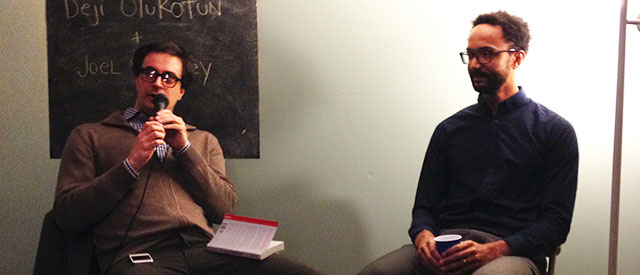
Deji Olukotun’s debut novel, Nigerians in Space (January 2014), explores three interlocked narratives traversing time and space. Joel Whitney, editor and co-founder of Guernica, joined him at WORD Bookstore in Brooklyn to discuss the novel. As a way of introduction, Whitney describes the novel as a “noir-ish” crime novel.
Olukotun began writing the novel while in South Africa. He holds an MA in Creative Writing from the University of Cape Town. While he attended the program, one of his professors had been writing a crime fiction series and Olukotun says he felt influenced by the plotting and dialogue this professor focused on.
The novel evolved naturally as he wrote. He mentions a section of the book, since edited out, that focused on the Goth scene in Cape Town. The section eventually ceased to hold any relevant relationship with the rest of the novel.
Nigerians in Space contains three story arcs focusing on a Nigerian scientist, an abalone thief, and the daughter of a freedom fighter. Olukotun explains that one challenge he faced included linking these disparate characters into a unified story.
The Nigerian scientist has been working in the United States for NASA. In the novel, another character wants to launch a Nigerian space program and asks the scientist to head it up, with the one condition that he steal a moon rock.

Whitney points to the plot as a narrative of brain gain for Africa, and asks about how this part of the book came about.
Olukotun explains that he, his father, and his brother traveled to Nigeria on a trip intended to help bring a new tech hub to the country. During the trip he encountered a kind of hostility directed towards Nigerians who left the country and then returned. He wanted to explore what that relationship would be like.
He did have to do some research. “The politics are so complicated…every time I thought I had a handle it I realized I missed something,” he says.
World politics has been colliding in fiction, Whitney says, adding that there seems a common trope of a faux category often referred to as immigrant fiction. But, he says, some people are pushing back–and then adds that Nigerians in Space seems to turn that immigrant narrative into reverse.
Nigerians face negative stereotypes, Olukotun says, and he wanted to show them as intelligent and compassionate people.
At a South African university, Olukotun says, he found himself looking to the United Kingdom. He read a lot of Martin Amis. He also read Walter Mosley, an American crime writer, and Samuel Delany’s Dhalgren (1975). Olukotun says Dhalgren messes with language and the plot was totally confusing. “That was work. I haven’t read something like that since college.” He hesitates in recommending the book, but also adds that he can’t stop thinking about it.
Nigerians in Space relies more on science than science fiction, and Whitney asks if Olukotun needed to do any kind of research.
The University of Cape Town had slow internet at the time, Olukotun says, and Wikipedia was not what it was today. He turned to actual books, including a book on space geology he found in the university library. That provided him with a lot of the scientific background for his novel.
Now, Olukotun says he is working on a new novel focused on a soccer referee and his brother, a professional soccer player. The book is set in New Jersey. Olukotun admits he has seen some Red Bulls matches, the Major League Soccer team that plays in Harrison, New Jersey. But he adds, his friends follow the team much more closely than he does.
“I always wanted to write short stories,” he says of his childhood. He tried substituting creative writing for homework assignments, but he says he was never given credit in school.
At one point in time he wanted to write about synesthesia, the phenomenon where people mix together sensory information like color and sound. That hasn’t worked.
“Rejection is a big part of this process,” he says about writing.
He believes that some people are natural writers. For him, he eventually hit a wall, and then sought out more formal instruction at the university level. “I do not write every day,” he adds, saying he lacks that sort of discipline and because he has an irregular work schedule. He is more likely to write in bursts, and then not write for a period of time. But whenever he has taken a break from writing, he ends up craving it.
Olukotun also works at PEN America providing legal assistance and free expression advocacy. He also works with PEN World Voices Festival, a program started with Salman Rushdie. The week-long festival brings global writers to New York City. Olukotun will read on May 2.
Olukotun now lives in Brooklyn. He says that when he goes into coffee shops in his neighborhood, “you know good stories are being written, and you know they’re your neighbors.”